[四国EPO・四国ESDセンターが、みなさんにおすすめしたい!と思った事例をご紹介していきます]
「地域が学べば地域が育つ」愛媛ダイビングセンターの取組 / When Communities Learn, Communities Grow: Ehime Diving Center’s Efforts / “地区学习,地区成长”——爱媛潜水中心的实践
「青い海中世界へ誘う癒しの海楽園 海好きなダイバーが集う憩いの隠れ家」
愛媛ダイビングセンターのホームページを開くとまず飛び込んでくるのはこのフレーズ。実はここ、ただのダイビングセンターではありません。
愛媛ダイビングセンターのある愛媛県の南予地域は長く海の豊かさを享受し、海と共にその歴史を刻んできた土地です。しかし他の地方同様、少子高齢化や海の仕事に就く若い世代の減少など、さまざまな課題を抱えています。そんな中、「地域が学べば地域が育つ」を合言葉に、地域の未来を考えるためのアクションを起こそうと、愛媛ダイビングセンターと地域の方々が立ち上がりました。
暑さもピークを迎えた8月3日。八幡浜市水産物地方卸売市場(八幡浜市魚市場)に18の団体が集まって出展し、楽しみながら地域を学ぶSDGsイベントが開催されました。気候変動教育、生産消費教育、生物多様性、エシカル消費、減災・防災、多文化共生、海洋・平和教育などさまざまな切り口で地域の魅力を発信し、SDGsにつながる学びを提供。特に海の仕事をしている人たちは温暖化の影響をリアルに感じており、それらを具体的に知ることで温暖化は他人事ではないこと、自分の住む地域の在り方を考える必要があることを誰もが感じた一日となりました。
「地球温暖化のように世界各地で起きている大きな変化については騒がれているが、注視(モニタリング)しなければならない問題は、足元で起きている小さな変化だということ、生物多様性の異変は、「生命の環」として「観光業」「地域振興」へのダメージ(地域経済の損失)へと繋がること、SDGs17の目標達成へ向けての活動が注目されているが、自分たちで活動を起こさなければ変革は起こり得ないこと(愛媛ダイビングセンターHPより抜粋)」
このメッセージを教育現場でも発信し、持続可能な社会づくり担い手を育む教育を実践していることから、愛媛ダイビングセンターは地域ESD拠点にも登録されており、その取り組みは県内外さまざまなところで紹介されています。
- <松柏中学校>
- <VR映像活用授業>
令和4年2月、愛媛ダイビングセンターの運営者が主体となって一般社団法人地方創生機構を設立し、海の環境課題に取り組んできた経験を地域づくりにも展開しています。西日本で初めてとなる全国8団体目の5省共管の環境教育等支援団体に指定され、また、令和6年度「令和の里海づくりモデル事業(環境省)」にも愛媛県で初めて採択されました。
愛媛ダイビングセンターと地方創生機構は、今後ICT教育を通じた取組等も視野に入れて活動する方針で、ここ南予地域における両団体の動きが、同じような課題を抱える多くの地方に波及効果を及ぼすことが期待されます。
- <サンゴ保全>
- <海底清掃>
※愛媛ダイビングセンター http://wwwd.pikara.ne.jp/ehime-dive/
※一般社団法人地方創生機構 https://region.jpn.org/
When Communities Learn, Communities Grow: Ehime Diving Center’s Efforts
“A rejuvenating underwater paradise, beckoning you into a world of blue. Welcome to the hidden retreat where ocean-loving divers gather.”
These are the words that greet you upon opening the Ehime Diving Center’s homepage — and the first hint that this is far more than just a simple diving school.
The history of Ehime Prefecture’s Nanyo region, where the Ehime Diving Center is located, is intertwined with the sea, and it has long enjoyed the sea’s bounty. However, like other rural areas, it faces various challenges including an aging population and a decline in younger generations entering maritime professions. Under these circumstances, the Ehime Diving Center and members of the community have created a new slogan, “When communities learn, communities grow,” in order get people thinking about the future.
August 3rd, at the peak of the summer heat. 18 organizations gathered at the Yawatahama Regional Seafood Wholesale Market (Yawatahama Fish Market) for an SDGs event focused on having fun while learning about the local area. It showcased the region’s appeal from various angles, such as climate change education, “prosumer” education, biodiversity, ethical consumption, disaster prevention and mitigation, and marine and peace education — all of which also provided learning opportunities connected to the SDGs. In particular, for the people who work on and around the sea and feel the effects of climate change in their day to day lives, the main takeaway was that fixing climate change isn’t somebody else’s problem, and that each of them must think about the future of their own communities.
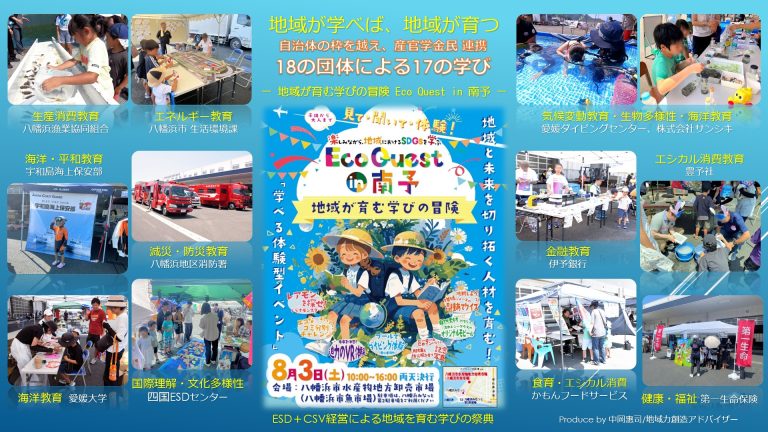
“While there is much commotion about major changes affecting the entire world, like global warming, the changes we must monitor carefully are the tiny ones happening beneath our own feet. Abnormalities in biodiversity ripple out as a ‘circle of life’ that negatively effects tourism and regional development, and causes real economic losses. There is much attention these days on activities aimed at achieving the 17 SDGs, but ultimately we are the ones who must initiate those activities to transform our world.” (From the Ehime Diving Center’s home page)
For their efforts in promoting this message in educational settings and implementing education to nurture future leaders for sustainable societies, the Ehime Diving Center has been registered as a regional ESD (Education for Sustainable Development) hub, and its initiatives have been introduced in various places both inside and outside of the prefecture.
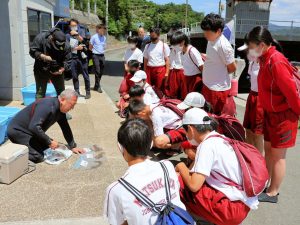
<Matsukaya Junior High School>
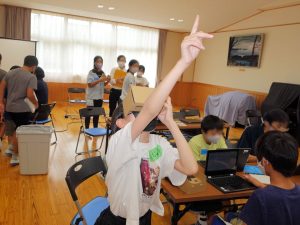
<Lesson using VR>
In February 2022, the operators of the Ehime Diving Center established the Rural Regeneration Framework, a general incorporated organization that leveraged their experience tackling marine environmental issues to address regional development as well. They became the eighth organization in all of Japan and the first organization in Western Japan to be designated an environmental education support organization jointly managed by five government ministries. Additionally, in the 2024 fiscal year they were the first organization from Ehime prefecture to be selected as a “Reiwa Era Satoumi-building Model Project” by the Ministry of the Environment.
The Ehime Diving Center and the Rural Regeneration Framework plan to incorporate ICT education in their future activities, and the initiatives of both organizations in the Nanyo region are expected to have ripple effects for many other rural areas facing similar challenges.
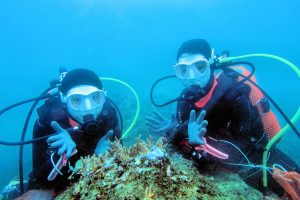
<Coral preservation>
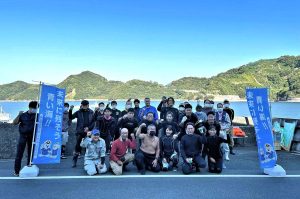
<Sea floor cleaning>
※ Ehime Diving Center
※ General Incorporated Association: Rural Regeneration Framework
“地区学习,地区成长”——爱媛潜水中心的实践
“通往蓝色海洋世界的治愈之海乐园,海洋爱好者的温馨港湾。”
打开爱媛潜水中心的官方网站,首先映入眼帘的便是这句宣传语。然而,这里不仅仅是一个潜水中心。爱媛潜水中心所在的爱媛县南予地区,长期以来受益于丰富的海洋资源,并与大海共存共生。然而,与许多其他地方一样,该地区也面临少子老龄化、年轻人从事海洋相关职业意愿下降等多重挑战。在这样的背景下,爱媛潜水中心与当地居民共同发起行动,以“地区学习,地区成长”为口号,积极思考地区的未来发展。
8月3日,正值炎炎夏日,18个团体齐聚八幡滨市水产品地方批发市场,共同举办了一场寓教于乐的SDGs(可持续发展目标)主题活动。活动涵盖了气候变化教育、生产与消费教育、生物多样性、道德消费、减灾防灾、多文化共生、海洋与和平教育等多个领域,向公众展示地区的独特魅力,并提供与SDGs相关的学习活动。特别是从事海洋工作的人员深刻体会到了全球变暖带来的影响,通过具体的示例,人们意识到全球变暖并非遥不可及的问题,并且有必要思考自己居住的地方的存在状态。

“尽管全球变暖等全球性问题在世界范围内受到广泛关注,但我们更应该关注的是那些发生在身边的微小变化。生物多样性的异常变化,不仅影响‘生命之环’,还可能对‘观光业’和‘地区振兴’造成损害。尽管SDGs的17个目标越来越受关注,但如果我们自己不采取行动,变革是不可能发生的。”基于这一理念,爱媛潜水中心在教育领域也进行了深度实践,致力于培养可持续社会的未来推动者。由于其在环境教育方面的突出贡献,该中心被认定为“地区ESD(可持续发展教育)据点”,其实践案例在县内外广受关注。


2022年2月,爱媛潜水中心的运营者主导成立了一般社团法人地方创生机构,将其在海洋环境问题上的经验拓展到地区振兴领域。该机构成为西日本首个、全国第八个获五省联合管理认定的环境教育支援组织。此外,在2024年度,又成为了爱媛县内首次入选环境省“令和的里海建设示范项目”的活动。今后,爱媛潜水中心及地方创生机构计划结合ICT教育等活动推进相关实践,这两个团体在南予地区的活动,也被期待着能够对面临同样课题的很多地方产生波及效果。


佐川おもちゃ美術館 / Sakawa Toy Museum / 佐川玩具美术馆
四国には、おもちゃ美術館が4箇所ある。
その中で、2023年にオープンしたのが、高知県佐川町にある佐川おもちゃ美術館だ。
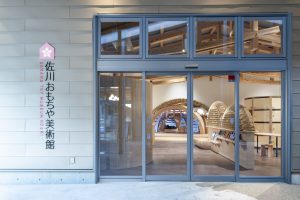
佐川町といえば、植物学者・牧野富太郎博士の出身地である。牧野博士にちなんで館内は「木育」だけでなく「植育」をテーマとした内装、什器、おもちゃが充実している。博士の愛した「バイカオウレン」を模した木の花が咲きこぼれるエリアもあり、よく考えられた空間デザインとなっている。
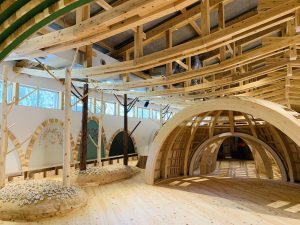
取材に訪れたのは、2024年8月、夏休み期間中で、沢山の方が来場していた。子どもから大人、お年寄りまで、高知県産材がふんだんに使われた館内でくつろぎながら、多世代交流を楽しんでいた。空間を取り巻く建物に目を向けると、梁の部分にはサスペントラス構造が取り入れられ、集成材に曲げがほどこされたドームや土佐組子の階段など、伝統と現代の技術が絶妙なバランスで組み合わさっている。名前だけ聞くと、子どもたちが主役の遊べる美術館というイメージを抱くが、大人にとっても沢山の見所と発見がある美術館だ。
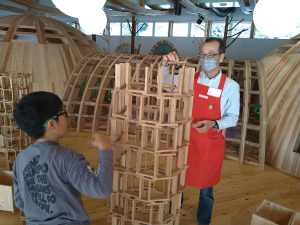
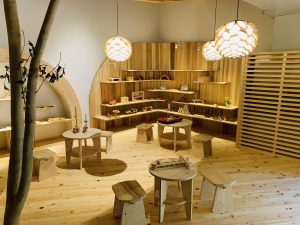
現在、おもちゃ美術館は全国にあり、東京おもちゃ美術館の総合監修のもと、それぞれの地域が設立し、「姉妹おもちゃ美術館協定」に基づき双方が連携しながら運営している。おもちゃ美術館のコンセプトに沿いつつ、地域の文化や歴史、特色もふんだんに盛り込まれている。そのため、1カ所訪問すると他の美術館にも行ってみたくなる。
四国には、徳島県那賀町、徳島市、高松市にある。ぜひ、皆さんに四国のおもちゃ美術館めぐりをおすすめしたい。
写真提供:佐川おもちゃ美術館
Sakawa Toy Museum
There are four toy museums in Shikoku. Among them, the Sakawa Toy Museum in Sakawa, Kōchi opened in 2023.

Sakawa is probably best known as the birthplace of the botanist, Dr. Tomitaro Makino. In his honor, the museum contains decorations, fixtures and toys that reflect the themes of both mokuiku (educational activities using wood) and shokuiku (educational activities using plants). The interior design has many thoughtful touches — there is even an area “in bloom” with wooden flowers modeled after the Coptis Japonica that Dr. Makino adored.

When I visited in August 2024, during summer vacation, the museum was full of visitors. People of all ages, from children to the elderly, relaxed and enjoyed intergenerational socializing surrounded by wood from Kōchi Prefecture. Looking at the structure of the building itself, the beam sections incorporate suspension trusses, and there are domes made from laminated wood as well as Tosa Kumiko stairs. It is a remarkable fusion of traditional and modern techniques. From the name alone you might imagine a place mainly for children to play, but this is an art museum with plenty to offer for adults as well.


Currently, there are toy museums throughout Japan, which were established by local communities under the supervision of the Tokyo Toy Museum, and are jointly operated based on the “Sister Toy Museum Agreement.” While they all have the same “toy museum” concept, each location incorporates local culture, history and specialties — so visiting one naturally makes you want to see the others, too!
Aside from the Sakawa Toy Museum, the other toy museums in Shikoku are in Naka and Tokushima in Tokushima Prefecture, and Takamatsu in Kagawa Prefecture. If you have a chance to visit them all, I highly recommend it!
Photos courtesy of Sakawa Toy Museum
佐川玩具美术馆
在四国,有四家玩具美术馆。 其中位于高知县佐川町的佐川玩具美术馆,于2023 年开馆。

佐川町是植物学家牧野富太郎博士的故乡。因此,该美术馆不仅以“木育”为主题,还融入了“植育”的概念,馆内的装饰、陈设和玩具都体现了这一特色。此外,馆内还有一个区域,盛开着以牧野博士钟爱的“梅花黄莲”为原型制作的木制花朵,空间设计可谓匠心独具。

采访是在2024 年8 月的暑假期间,正值游客众多之时。从儿童到成人,甚至是老年人,大家都在这座大量采用高知县的本地木材建造的美术馆内放松身心,享受着跨越年龄层的交流。如果观察馆内建筑空间,屋梁采用了悬梁结构,胶合木经过弯曲处理,营造出穹顶造型,楼梯则运用了“土佐组子”工艺,将传统与现代技术以绝妙的平衡组合在一起。如果听到“玩具美术馆”这个名字,可能会以为是专为儿童打造的游乐空间,但实际上这里对成年人来说同样是充满看点与新发现的美术馆。


如今,全国各地都设有玩具美术馆,而这些美术馆均在东京玩具美术馆的总体指导下,由各地区自行设立,并以“姐妹玩具美术馆协议”为基础相互合作、联合运营。每家美术馆不仅秉承玩具美术馆的理念,还充分融合了当地的文化、历史和特色。因此,参观过一家玩具美术馆后,往往会激发前往其他美术馆的兴趣。
四国地区在德岛县那贺町、德岛市以及高松市也有玩具美术馆。由衷地推荐大家去四国体验一场玩具美术馆之旅!
神山発「まめのくぼプロジェクト」 / Kamiyama’s “Mamenokubo Project” /
中国四国地域の耕作放棄地面積は、経営可能な耕地の約20%(※1)に迫ろうとしており、全国平均と比較するとかなり高めで推移している。この傾向は、四国の山間地域では特に顕著で、人口減少・過疎とあわせ、重要な地域課題である。
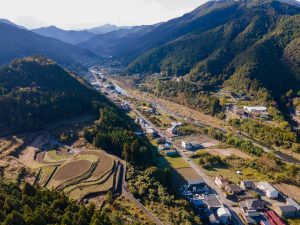
(※2)
この課題に向き合い活動を続けているのが、徳島県立城西高校神山校「まめのくぼプロジェクト」である。町内の谷地区の段畑、通称「まめのくぼ」を地域の方から借り受けて栽培を始めたのが2018年。当初は、70年以上神山で継がれている「神山小麦」の栽培からスタートしたそうだ。
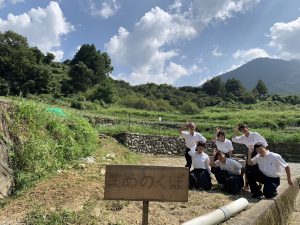
集落を通り抜けた急斜面に広がる段畑は管理面積 約9,000㎡、耕作面積 約2,100㎡に及ぶ。実践の場は、毎年、さまざまな作物が栽培されており、何を植えるかは、生徒同士の話し合いや検討の中で決まる。取材に訪れた日は、ちょうど綿の花が開花していた。小麦やソバの栽培とともに、お茶やビワも植栽されている。
また、中山間地においては、獣害対策は必須、植栽地の周囲には電気柵がはりめぐらされている。ここではシカとの共生もテーマとなっている。さらに、耕作放棄地を耕地として再生し維持するために、栽培技術の習得や野生動物から作物を守る方法、段畑を維持するための石積みの補修など、やらなければならないことは、沢山ある。それに加えて、有機JAS登録や生物多様性認証にもチャレンジしており、ここはまさに学びと実践の先進地といっても過言ではない。
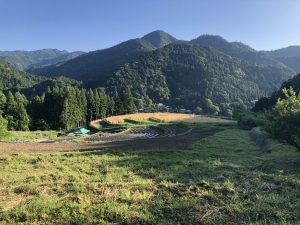
(※2)
放棄された農地を再生することが「大変」なのは間違いない。しかし、このプロジェクトに関わる生徒からは、「大変」以上に「まめのくぼが好き」「楽しい」「将来農家をやりたい」という感想や夢を沢山聞くことができた。その原動力は何なのだろう。先輩から引き継いだこと、新たな挑戦とやりがい、地域内の人に知ってもらおうと始めた「まめのくぼのつどい」など、そこには、紛れもない生徒の本気があり、それを受けとめて返してくれる地域の懐の深さ・温かさを実感し、そこにヒントがあるのではと感じた。
もっとみんなに知ってほしい。生徒の思いが地域の力となって、「まめのくぼプロジェクト」の発信は続く。
※1:中四農政局資料https://www.maff.go.jp/j/council/seisaku/nousin/bukai/h27_chiho_kondan/chushi/pdf/siryou_2.pdf
※2:写真提供協力(徳島県立城西高校神山校)
Kamiyama’s “Mamenokubo Project”
The area of abandoned farmland in the Chugoku-Shikoku Region is approaching about 20% of the total manageable arable land (※1), which is significantly higher than the national average. This trend is particularly pronounced in the mountainous areas of Shikoku, making it a critical regional issue alongside population decline and rural flight.

(※2)
The “Mamenokubo Project” at the Kamiyama Branch School of Tokushima Prefectural Jyosei High School is actively taking on the challenge. It began in 2018, when students borrowed a terraced field in the Tani district, known colloquially as “Mamenokubo,” from the local residents. Initially they cultivated “Kamiyama Wheat,” a variety of wheat which has been grown in Kamiyama for over 70 years.

The terraced fields, spreading over the steep slopes outside the village, have a management area of about 9,000 m2 and a cultivation area of about 2,100 m2. Every year, students grow various crops, deciding what to plant through mutual discussion and careful deliberation. The day I visited, the cotton flowers had just come into bloom, and in addition to wheat and buckwheat, they were also growing tea and loquats.
In the mountains, countermeasures to prevent damage from wild animals are vital, so the field is surrounded by an electric fence. Coexistence with deer is also one of the themes of the project. Furthermore, reclaiming and maintaining abandoned farmland involves a mountain of work, from learning farming techniques and how to protect crops from wild animals, to repairing the stonework supporting the fields. On top of that, they have obtained JAS organic certification and Tokushima’s biodiversity certification. It wouldn’t be an exaggeration to say this place stands at the forefront of applied learning.

(※2)
There is no question that reclaiming abandoned farmland is difficult. However, the students that I’ve spoken to involved with this project don’t seem to mind. The vast majority told me things like, “I love Mamenokubo,” “It’s fun,” and “I want to be a farmer in the future.” What is it that drives them? Is it a sense of duty to continue what they inherited from their seniors at school? A feeling of accomplishment from trying new things? The “Mamenokubo Meeting” they started to spread the word about what they’re doing? Or is it the profound depth and warmth of the community that accepts and responds to their unmistakeable efforts? That, I believe, may be the key.
I hope more people will learn about the students’ dedication, which is becoming a source of strength for the region, and that the “Mamenokubo Project” continues to spread its message.
※1: Chugoku-Shikoku Agricultural Administration Bureau document
※2: Photos courtesy of Tokushima Prefectural Jyosei High School Kamiyama Branch School
“Mame no kubo 项目”
中四国地区的撂荒耕地面积已接近可耕地总面积的20%,远高于全国平均水平。这一趋势在四国的山区尤为明显,人口减少和过疏化问题交织,使其成为该地区的重要课题。

面对这一挑战并持续开展相关活动的是德岛县立城西高中神山校的“Mame no kubo项目”。该项目始于2018年,最初由学校向当地居民租借镇内谷地区的梯田——通称“Mame no kubo”进行耕作。最初,他们从种植在神山地区传承70余年的“神山小麦”开始。

梯田位于穿越村落的陡峭坡地之上,管理面积约9,000平方米,可耕种面积约2,100平方米。每年,学生们都会种植各种作物,并通过讨论和研究决定具体种植品种。采访当天,正值棉花盛开。除了小麦和荞麦,这里还种植了茶树和枇杷等农作物。
在山区农业中,防范野生动物侵害是不可或缺的环节,因此,种植地周围设置了电围栏。如何与鹿共存也是该项目的一大主题。为了复耕并维持这些撂荒地,学生们不仅要掌握农作物种植技术,还要学习如何保护作物免受野生动物侵害,并进行梯田石墙的修复等工作。此外,他们还挑战了有机JAS认证和生物多样性认证。这里不仅是学习的场所,更是实践的前沿基地。

毫无疑问,复耕撂荒地的过程是“艰难”的。然而,参与该项目的学生们却纷纷表示,他们的感受远不止“艰难”,更多的是“喜欢Mame no kubo”“很有趣”“未来想成为农民”等积极的想法和梦想。那么,这股动力来自何处?从前辈手中接过的经验、新的挑战及其意义、为了获得本地人的理解而开展的“Mame no kubo集会”、还有学生们的毫无保留的认真、接受并回馈地方的包容与温暖的真实情感等,想必在这些当中便有答案。想要让更多的人了解这个项目;让学生的想法成为地域的力量,有关“Mame no kubo项目”的信息发布仍在持续。



